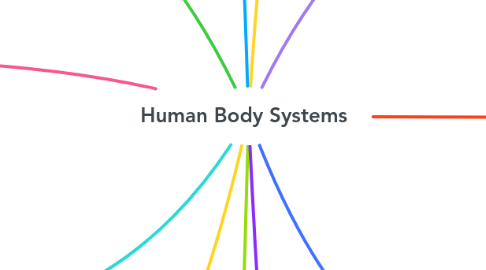Human Body Systems
by Kelly Bruzdewicz


1. Nervous System
1.1. Brain
1.2. Spinal Cord
1.3. Nerves
1.4. Sensory Organs
1.5. FUNCTION: Coordination, sensory perception, stimuli response
2. Excretory System
2.1. Kidneys
2.2. Bladder
2.3. Ureters
2.4. Urethra
2.5. FUNCTION: Liquid waste removal, water balance
3. Integumentary System
3.1. Skin
3.2. Hair
3.3. Nails
3.4. FUNCTION: Protection, temperature regulation, and sensation
4. Immune System
4.1. White Blood Cells
4.2. Lymph nodes
4.3. Spleen
4.4. Thymus
4.5. FUNCTION: Defense against pathogens, immune response
5. Circulatory System
5.1. Heart
5.2. Blood Vessels
5.3. Blood
5.4. FUNCTION: Transport of oxygen and nutrients, waste removal, immune response
6. Respiratory System
6.1. Lungs
6.2. Trachea
6.3. Bronchi
6.4. Diaphragm
6.5. FUNCTION: Gas exchange, regulation of blood Ph
7. Lymphatic System
7.1. Lymph Nodes
7.2. Thymus
7.3. Spleen
7.4. FUNCTION: Blood filtration, immune response
8. Muscular System
8.1. Skeletal Muscle
8.2. Smooth Muscle
8.3. Cardiac Muscle
8.4. FUNCTION: Movement, posture, heat production
9. Skeletal System
9.1. Bones
9.2. Cartilage
9.3. Joints
9.4. Ligaments
9.5. FUNCTION: Structure, protection of organs, blood cell production
10. Reproductive System
10.1. Biologically Male
10.1.1. Testes
10.1.2. Penis
10.1.3. Prostate
10.2. Biologically Female
10.2.1. Ovaries
10.2.2. Uterus
10.2.3. Vagina
